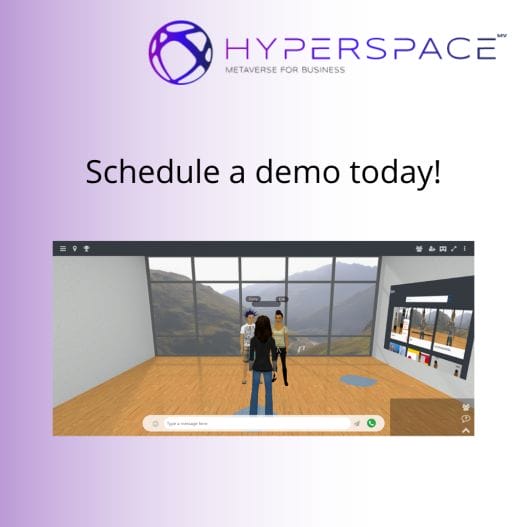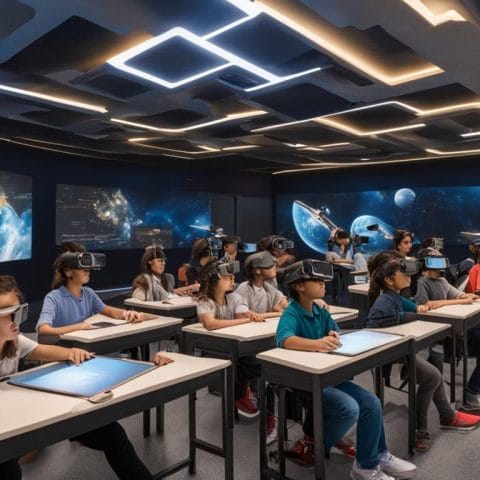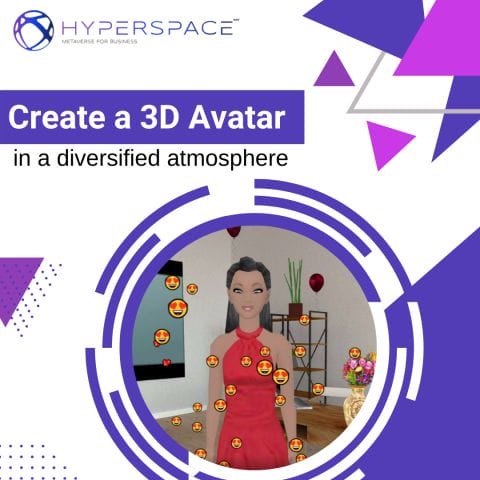As metaverse technology continues to evolve, businesses realize the potential of Metaverse Industrial Solutions as a powerful tool for creating immersive experiences and innovating their supply chain operations. With the help of Metaverse Industrial Solutions, businesses can unlock numerous possibilities, from virtual training simulations to sophisticated and highly-customized solutions.
As a result, businesses can improve their operations and offer their customers engaging experiences that were once unimaginable. With the rapid growth of the metaverse industrial space, the possibilities for businesses are endless, and those that invest in this technology today are well-positioned to stay ahead of the competition.
With careful consideration given to security protocols and best practices, companies can now leverage this cutting-edge technology to explore new opportunities within their industry.
This blog post will discuss how businesses can use metaverse industrial solutions, provide examples of successful implementations, and consider essential considerations such as security measures.
Table of Contents:
- What is the Metaverse?
- How Can Businesses Leverage the Metaverse?
- What Are Some Examples of Companies Using the Metaverse?
- What Are The Security Considerations for Businesses Using The Metaverse?
- What Are The Best Practices for Implementing a Successful Metaverse Solution?
- FAQs about Metaverse Industrial Solutions
- Conclusion
What is the Metaverse?
The metaverse is a virtual world created by humans but experienced through digital technology. It’s an interconnected network of user-generated 3D environments and persistent online communities with the potential to revolutionize how we interact, learn, work, and play.
Definition of the Metaverse:
The concept of the “metaverse” is not new. It was introduced in Neal Stephenson’s science fiction novel Snow Crash in 1992 as a shared virtual reality experience. Today, the term describes any immersive three-dimensional space accessed over the internet or other digital networks. It’s an augmented reality that allows users to create digital identities and explore virtual realms filled with people worldwide.
Businesses that embrace the metaverse can reap numerous benefits, including increased collaboration between dispersed teams, enhanced customer engagement, and improved training experiences. In addition, just like in the real world, the content you add to your metaverse is persistent and always accessible, allowing you to pick up where you left off anytime, from anywhere.
Additionally, there are cost savings due to decreased travel expenses, access to global talent pools, streamlined communication channels, and the extended market reaches through new media platforms like augmented reality (AR) and virtual reality (VR).
Businesses can also access powerful analytics tools that monitor user behavior within their metaverses. The metaverse is an evolving digital realm that presents endless business opportunities. Companies can leverage this technology to develop innovative solutions that enhance operations and offer customers an engaging experience.
With the right tools, businesses can unlock new opportunities in the metaverse industrial space and stay ahead of the competition. The possibilities are endless, and the only limit is your imagination.
Key Takeaway: The metaverse is an ever-expanding digital universe where businesses can access powerful analytics, benefit from cost savings, and collaborate with dispersed teams. This interconnected system of 3D worlds furnishes a chance to transform how we collaborate, learn, operate, and amuse ourselves in the industrial realm.
How Can Businesses Leverage the Metaverse?
No-code systems such as Hyperspace allow businesses to construct their virtual realities rapidly and simply with a user-friendly drag-and-drop interface. By leveraging the metaverse for industrial applications, companies can unlock various new opportunities in supply chain solutions.
Industrial Applications of the Metaverse:
Companies across various industries have started utilizing the metaverse for multiple purposes, such as product design reviews, engineering simulations, and remote collaboration. For example, automotive manufacturers use it to simulate factory operations, while retail brands leverage it for digital shopping experiences.
In addition to this, healthcare organizations are using it to provide remote patient consultations or medical education programs. 3D models that enable users to interact with virtual objects without any physical or movement restrictions, allowing them to engage from anywhere in the world, are utilized for these applications.
Supply Chain Solutions in The Metaverse:
Businesses can also use the metaverse’s ability to facilitate real-time collaboration between different departments within an organization and external partners such as suppliers and customers through virtual meetings and workshops. By taking advantage of the metaverse’s capabilities, teams can collaborate more effectively by leveraging shared resources across geographic boundaries and limited infrastructure.
Additionally, by using 3D visualizations, companies can better understand how changes in one part may affect another. This allows them to optimize their processes more effectively, increasing productivity and cost savings.
Businesses can leverage the metaverse to create immersive experiences, improve customer engagement and provide innovative solutions. By exploring industry-specific examples of companies using the metaverse, businesses can better understand how they could benefit from this powerful technology.
Key Takeaway: The metaverse provides businesses with a powerful platform to unlock new opportunities in supply chain solutions, from product design reviews and engineering simulations to remote collaboration and digital shopping experiences.
With its ability to facilitate real-time communication between different departments and external partners such as suppliers and customers, companies can leverage the virtual world for improved efficiency, increasing productivity while saving costs simultaneously.
What Are Some Examples of Companies Using the Metaverse?

The automotive industry is one of the most prominent users of the metaverse. For example, Mercedes-Benz and BMW are leveraging virtual reality to provide a realistic 3D experience, enabling customers to explore their cars before purchasing virtually. In addition, they’re also utilizing augmented reality to allow customers to virtually customize their vehicles with different colors and options before buying them.
Retailers are also beginning to take advantage of the metaverse by creating digital stores replicating real-world shopping experiences. Shoppers can now browse products virtually in digital showrooms or purchase items directly from within the metaverse.
Finally, healthcare organizations are exploring how they can use the metaverse for patient care and education. For example, doctors could use it for remote consultations with patients who live far away from their practice or provide educational videos about medical procedures through an interactive 3D experience.
Additionally, hospitals may leverage it to train new staff members on complex medical procedures in a simulated environment that replicates real-life scenarios more closely than traditional methods such as textbooks or lectures.
The examples of companies using the metaverse show that businesses from various industries already use this innovative technology. It is essential to consider the security considerations for businesses utilizing this platform, as these measures can ensure data protection and privacy, authentication and access control, and proper network protocols.
“Explore the possibilities of #MetaverseIndustrialSolutions for your business. The metaverse transforms how we do business, from virtual showrooms to remote consultations. #VirtualReality #AugmentedReality Click to Tweet. Click To Tweet
What Are The Security Considerations for Businesses Using The Metaverse?
Data Protection and Privacy Concerns:
As businesses move into the metaverse, they must protect their data from unauthorized access. Therefore, they protect customer information such as credit card numbers, addresses, and other personal details. Furthermore, companies should allow users to consent to or refuse data collection.
Additionally, companies should be aware of any applicable laws or regulations related to data protection and privacy in the countries where their customers reside. Finally, authentication processes such as 2FA or MFA should be implemented to guarantee secure access to virtual environments.
Companies can also use role-based access control (RBAC) systems which allow different levels of permission based on a user’s position within an organization. These systems are essential for organizations with multiple departments operating in the metaverse simultaneously.
Network safety measures such as TLS, SSL, VPNs, firewalls, IDS, and malware scanners are essential for safeguarding virtual domains from malicious actors. Companies should also consider using encryption technologies like AES 256bit when transmitting sensitive data across networks and regularly patching software vulnerabilities to reduce potential attack vectors.
Finally, companies must have policies regarding acceptable usage guidelines so employees know what behavior is expected while interacting with others in the metaverse environment.
Security considerations for businesses using the metaverse should be taken seriously to ensure that data is kept safe and secure. Businesses can confidently implement successful metaverse solutions by establishing clear goals, developing a comprehensive strategy, and utilizing appropriate technologies.
What Are The Best Practices for Implementing a Successful Metaverse Solution?
When implementing a successful metaverse solution, the best practices are setting clear goals and objectives, developing an effective strategy, and utilizing appropriate technologies. Establishing clear goals and objectives is essential for any project or initiative. In addition, it’s important to have specific targets in mind before beginning work on the metaverse platform so that you can measure success against those benchmarks. Developing a comprehensive strategy is also vital to ensuring success with your metaverse implementation, including user experience design, data management plans, security protocols, scalability considerations, integration with existing systems and processes, cost-benefit analysis of potential solutions, etc. Finally, it’s crucial to utilize appropriate technologies when building out your virtual world; this means selecting tools that meet your organization’s needs while providing robust performance at scale – no one wants their virtual world crashing every time someone logs in. By taking these steps, you will be well-positioned for success when launching your metaverse solution.
“Create a successful #metaverse solution with clear goals, an effective strategy, and the right tech. Then, let’s make it happen.” #IndustrialSolutions Click to Tweet. Click To Tweet
FAQs about Metaverse Industrial Solutions
What is an industrial metaverse?
An industrial metaverse is a virtual world created using 3D and interactive technology where users can interact with each other and the environment. It enables businesses to establish an immersive digital presence that can be employed for instruction, promotion, cooperation, teaching, and much more.
The industrial metaverse claim access to real-time data-driven insights from customers and employees while enabling companies to create customized experiences tailored to their needs. In addition, its ability to simulate physical spaces virtually has become an invaluable tool for organizations looking to innovate within their industry or expand into new markets.
What industries use Metaverse Industrial Solutions?
Metaverse technologies is rapidly gaining traction in various industries, from healthcare to education, entertainment, and retail. From healthcare to education, entertainment, and even retail, businesses are leveraging the power of the metaverse platform for immersive experiences.
For example, in healthcare, virtual reality can be used to create simulations that allow doctors and nurses to practice complex procedures without putting patients at risk; in education, it can provide students with an interactive learning environment; in entertainment, it can offer users engaging 3D gaming worlds; and in retail it allows customers to explore products before they buy them virtually.
Metaverse technology has limitless potential applications as organizations continue to innovate their processes using this cutting-edge technology.
How can metaverse experiences help in manufacturing?
Metaverse technology can help manufacturers in a variety of ways. For example, creating virtual simulations allows them to test and develop new products faster and more efficiently. In addition, Metaverse tech allows multiple divisions to share data in real time, granting unprecedented insights into product performance.
Additionally, metaverse technology provides access to global markets, enabling companies to reach customers they could never have before while reducing costs associated with physical trade shows or exhibitions. In short, metaverse technology offers manufacturers an efficient way to innovate their processes and expand their customer base on a global scale.
What is the impact of the metaverse on the industry?
The metaverse is a revolutionary new way for businesses to interact with customers, create immersive experiences, and train employees. It allows one to transcend the physical limitations of distance and time by simultaneously existing in multiple virtual realms.
The impact of this technology on the industry is far-reaching; it enables organizations to increase their reach across global markets, provide innovative customer engagement opportunities, reduce costs associated with training programs, and foster collaboration between teams from different countries or locations.
Businesses can unlock many possibilities in marketing automation and product development by utilizing AI technologies like NLP, ML, and CV within their virtual worlds.
By leveraging these powerful tools within their virtual environments, they can unlock tremendous marketing automation and product development potential.
Conclusion
In conclusion, the metaverse is a continuously-developing digital realm that offers numerous advantages to businesses willing to explore its potential. However, before taking the plunge, businesses must consider all aspects of a successful implementation, from understanding what the metaverse can offer to leverage its capabilities, security considerations, and industry-specific best practices. Each business must carefully evaluate its needs to ensure a successful implementation in this exciting new world.
To “futureproof” your metaverse, consider using Hyperspace. This browser-based platform enables access on all devices, including smartphones, tablets, laptops, and VR/AR headsets, without downloading or installing software. Finally, companies can tap into the endless Metaverse possibilities for working together, education, coaching, and advertising in a vivid digital setting that will assist them in staying on top of the game amid today’s rapidly developing digital sphere. And all of that without needing an army of developers, overpaid consultants or a multi-million dollar budget.
Bring your business into the metaverse easily using our intuitive no-code platform to create and customize virtual worlds tailored to your needs. Unlock immersive learning, training, and marketing campaigns with our customizable templates, and take your business to the next level in the metaverse industrial space. With Hyperspace, the possibilities are endless and the only limit is your imagination.





